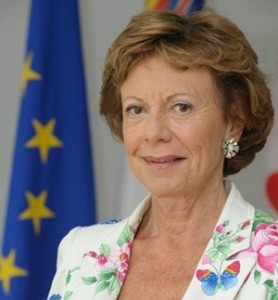Kroes calls for single content market
February 8, 2011
By Colin Mann
 Opening up access to online content is a good start in ending fragmentation in the digital Single Market, according to Neelie Kroes, the EU Commissioner responsible for the Digital Agenda. Speaking at a London event on ‘Building a Digital Single Market: Delivering Benefits of the Digital Economy to Europe’s Citizens’, she said that “every gap, and every failure to keep up with developments in the digital economy that lead to growth, holds us back from long-term recovery. Recognising that at the European level “we need to make hard reforms if we want the Single Market to live up to its name,” she said that top of her list was ending fragmentation in the digital Single Market and ensuring it runs using the best digital infrastructure.
Opening up access to online content is a good start in ending fragmentation in the digital Single Market, according to Neelie Kroes, the EU Commissioner responsible for the Digital Agenda. Speaking at a London event on ‘Building a Digital Single Market: Delivering Benefits of the Digital Economy to Europe’s Citizens’, she said that “every gap, and every failure to keep up with developments in the digital economy that lead to growth, holds us back from long-term recovery. Recognising that at the European level “we need to make hard reforms if we want the Single Market to live up to its name,” she said that top of her list was ending fragmentation in the digital Single Market and ensuring it runs using the best digital infrastructure.
“It will not be easy, but opening up access to online content is a key start. Digitisation has fundamentally changed content industries, but licensing models simply have not kept up with this. National licensing can create a series of Berlin cultural walls. The price both in pounds and frustration is all too real, as creators are stifled and consumers are left empty-handed,” she said.
“At the same time, we have to fight piracy, in order to allow a fair remuneration of right-holders and give the legal offers a chance to succeed. Entrepreneurs suffer too. But these problems are not limited to the marketplace and economic implications. Think of the treasures that are kept from the public because we can’t identify the right-holders of certain works of art. These ‘orphan works’ are stuck in the digital darkness when they could be on digital display for future generations,” she noted.
“It is time for this dysfunction to end. We need a simple, consumer-friendly legal framework for making digital content available across borders in the EU,” she declared.
She recognised that each day was still “an uphill battle – to get all levels of government and business to see that digital innovation and investment is of direct benefit to them. We don’t have the imagery of a space race to help set the scene. But we still have to get this massive job done.”
At European level she said the job was “to enable the framework conditions and to bring parties together so that we enjoy the benefits of being a European family. But it is up to national governments and most importantly the private sector to do most of the implementing. In fact, it is worth repeating that virtually everything in the Digital Agenda is based on collaboration. It’s about a team effort of literally millions. I have absolutely no doubt we are on the right course.”
